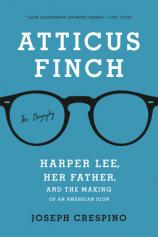Atticus Finch: The Biography: Harper Lee, Her Father, and the Making of an American Icon
Review
Atticus Finch: The Biography: Harper Lee, Her Father, and the Making of an American Icon
Harper Lee’s TO KILL A MOCKINGBIRD is one of the most influential novels of the 20th century. Countless young adults, coming of age when it was published in 1960, chose to become attorneys because of the character of Atticus Finch, portrayed by Gregory Peck in the movie based on Lee’s fictional account of her life growing up in Alabama. Adding to the aura of MOCKINGBIRD was Lee’s post-publication decision to live her life outside the public eye and to never write another book. Not until shortly before her death would a second novel, GO SET A WATCHMAN, be published. Shrouded in controversy and mystery, readers and reviewers were divided regarding WATCHMAN. Questions abounded, with the central debate raging over whether or not the portrayal of Atticus as a southern racist was inspired by the real Atticus Finch, Lee’s father.
In the first decades of the 21st century, there were many attempts to break through the mysteries of Lee’s life. Several unauthorized biographies released, and even those that had her cooperation became shrouded in controversy because her estate objected to some of the portrayals. Recently, an attempt to adapt MOCKINGBIRD to a new play resulted in litigation from her estate and a court settlement that will allow the show to open in New York later this year.
"Crespino’s scholarly and well-written history leaps to the top of the books you should read if you are a TO KILL A MOCKINGBIRD devotee."
Joseph Crespino’s ATTICUS FINCH: THE BIOGRAPHY is a different take on the entire Harper Lee oeuvre. Rather than gossip, it is the work of a scholar of the American South. Crespino has written a biography of Strom Thurmond, as well as historical studies of southern culture during the years portrayed in MOCKINGBIRD and WATCHMAN. He brings a more scholarly and intellectual approach to a biography of A. C. Lee and Harper Lee that attempts to place their lives in the southern era that encompassed the racial revolution occurring in post-World War II America.
Roughly one-third of this 200-page book is devoted to the life of Amasa Coleman Lee. Crespino is a historian and scholar, and employs resource material previously unused by other biographers. They include letters from Lee’s publisher and the hundreds of editorials A. C. Lee wrote during his tenure as editor of The Monroe Journal, where he commented on a vast range of subjects covering state, national and even international issues. A. C. Lee was deeply engaged in the important events of his time. He had a sense of civic responsibility and a belief that the problems of America were also the problems of his tiny hometown. He was a devout Methodist and pillar of his community who would be elected to local and state offices. His formal education ended after eighth grade, but after working for one year in a law office, he read and studied for the Alabama bar exam and was admitted to the bar in 1915. Crespino concludes that while A. C. Lee was partially a model for the fictional Atticus Finch, he also was a man whose political views differed from those of his daughter.
The remainder of Crespino’s study is a scholarly discussion of Lee’s novels in the context of the racially evolving South. Crespino accepts the view that WATCHMAN was a first manuscript of what ultimately would be published as MOCKINGBIRD. From the original drafts to the conclusion of these books, events occurring in Southern states, now facing court-ordered integration of schools and other public facilities, changed Lee’s opinion of her beloved South as well as that of her own father. The Atticus Finch depicted in MOCKINGBIRD was partially the man she knew, but also the man she wished he could have been. Crespino notes changes in the two manuscripts that support an evolving view from Lee. It is a remarkable study of how MOCKINGBIRD changed and why those arguing that WATCHMAN never should have been published seem to have the better argument.
There have been many efforts to examine the private life of Harper Lee and the novel that made her so famous. Each have flaws that hamper the literary case they make. Crespino’s scholarly and well-written history leaps to the top of the books you should read if you are a TO KILL A MOCKINGBIRD devotee.
Reviewed by Stuart Shiffman on May 18, 2018
Atticus Finch: The Biography: Harper Lee, Her Father, and the Making of an American Icon
- Publication Date: October 20, 2020
- Genres: Biography, History, Nonfiction
- Paperback: 272 pages
- Publisher: Basic Books
- ISBN-10: 154164493X
- ISBN-13: 9781541644939




